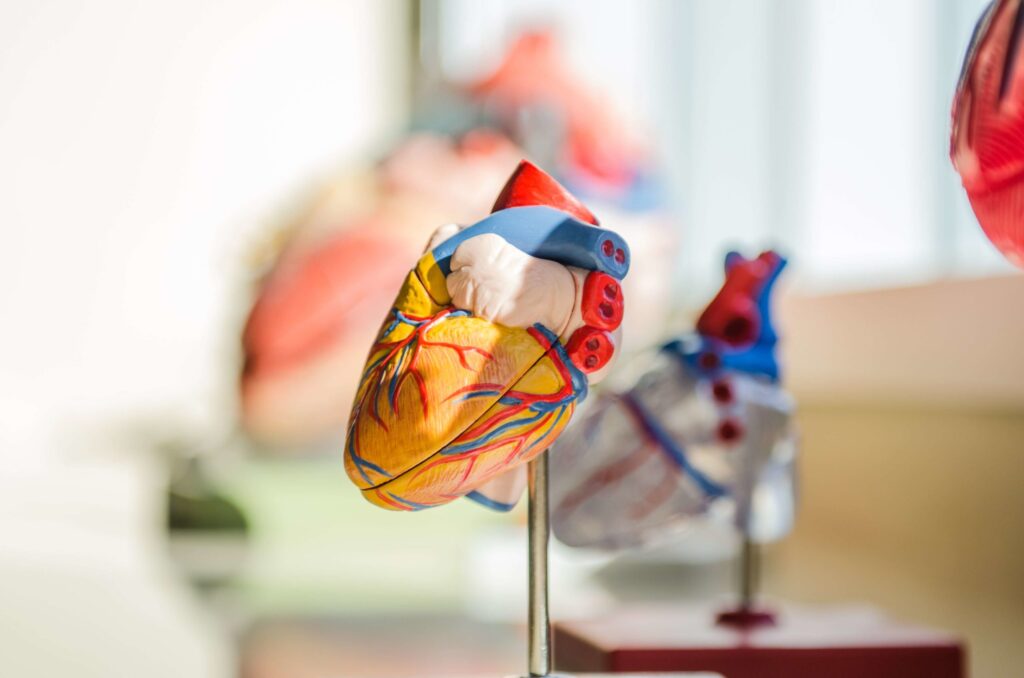Skip To Section
Substance abuse damages your physical and mental health. One area that can take a big hit from alcohol and drug abuse is your circulatory system. Substances shown to impact cardiovascular health include:
- Alcohol
- Tobacco
- Cocaine
- Stimulants like methamphetamine
- Diet pills
- Opioids
- Hallucinogens
- Ecstasy
- Performance-enhancing drugs
- Certain combinations of drugs
The potential to repair damage from drugs and alcohol depends on factors like:
- Severity of drug and alcohol abuse.
- Type of drug abused.
- Length of time abusing drugs or alcohol.
- Your individual physical makeup.
- Co-occurring medical conditions like heart disease, eating disorders, etc.

How Drugs Affect the Heart and Circulatory System
The circulatory system consists of the heart, veins, and arteries. The heart pumps blood throughout the body via arteries, and veins return blood back to the heart. The circulatory system transports nutrients, oxygen, and hormones throughout the body. It also moves carbon dioxide out of your system. Chronic abuse of many types of drugs, including prescription drugs and alcohol, can have significant effects on the heart and circulatory system.
Performance-Enhancing Drugs
Performance-enhancing drugs such as steroids are synthetic substances that mimic certain hormones like testosterone. Performance-enhancing drugs may disrupt the balance of the natural substances in your body. This can lead to an increased risk for cardiovascular issues like:
- Stroke
- Cardiomyopathy (chronic disease of the heart muscle)
- Heartbeat irregularities like arrhythmias
- Heart failure
Other Substances That Affect the Circulatory System
Combining drugs can lead to dangerous cardiovascular effects. When drugs with similar mechanisms of action are combined, they enhance each other’s effects, including the detrimental ones. These combinations include:
Combining drugs can exacerbate damage to the circulatory system that might occur from either drug alone. When combining drugs that have opposing effects, like alcohol and stimulants, you may engage in heavier use because the effects of these drugs tend to lower the desired effect of the other drug. This can lead to an even greater potential for damage to the circulatory system or other organ systems in the body.
"*" indicates required fields
Fill out the form below and one of our admissions team members will reach out to you:
"*" indicates required fields
How Drug Overdose Can Cause Cardiovascular Failure
Drug overdose is one of the leading causes of cardiac arrest in the U.S. One study found that almost 17% of people hospitalized for acute drug overdose will have an adverse cardiovascular effect such as heart failure.
If you’ve overdosed on drugs, you’re likely abusing substances enough that you’re at risk for the myriad of cardiovascular issues from substance abuse that can lead to heart disease and heart failure.
A study on 49,712 ER visits and hospitalizations due to cardiovascular failure found that over 7500 people had a substance use disorder. The most common addictions among the group were:
- Methamphetamine addiction
- Alcohol addiction
- Opioid addiction
These drugs had cardiovascular associations comparable to conditions like:
- Chronic kidney disease
- Ischemic heart disease
- Atrial fibrillation
Drugs and alcohol abuse put a strain on your heart. Research shows that substance abuse can double your chances of developing conditions like heart disease that put you at higher risk for heart failure. A study of substance abusers aged 15-35 shows that abusing drugs like tobacco, marijuana, cocaine, and prescribed psychotropic medications put them at higher risk for sudden cardiac death.
Can Drug Damage to the Heart Be Reversed?
Whether cardiovascular damage resolves after you quit using substances depends on the type of drug and the severity and duration of abuse. Research on the cardiovascular health of chronic cocaine users found damage to their circulatory system even after they stopped using the drug. On the other hand, research on improved health of chronic methamphetamine users shows that damage to the circulatory system was reversed to some extent when they stopped using drugs.
People who contract infectious diseases through needle sharing may develop irreversible damage to the heart muscle or walls of the veins and arteries, even if their drug use was not severe. Individuals who chronically abuse alcohol may experience a reversal of liver damage associated with their abuse if the damage is not advanced. However, in cases of advanced harm from drug use, damage to organs like the heart and liver may not fully resolve.
Alcohol Misuse
Alcohol is one of the most abused drugs in the United States. According to the American Heart Association, excessive alcohol use is a known cause of cardiovascular disease. Chronic alcohol misuse can lead to:
- Heart failure – The heart doesn’t pump enough blood to service the organs and other tissues.
- Arrhythmia – Irregular heart rhythms.
- Anemia – Low levels of hemoglobin cause the heart to work harder to pump blood to transport oxygen.
Alcohol can also interfere with your ability to digest food, making the circulatory system less effective in delivering nutrients to your system.
Tobacco Use
Like alcohol, because tobacco is legal, it is a common drug of abuse. Tobacco products like cigarettes contain carcinogens that can increase your risk for many different types of diseases and disorders. Tobacco use is associated with an increased risk for cardiovascular disease, including heart attacks and stroke. This increased risk even applies to younger people who smoke cigarettes or use tobacco products.
Cocaine Use
Cocaine is a powerful central nervous system stimulant produced from the leaves of the coca plant. Chronic cocaine use can lead to dehydration, which can damage various organ systems, including the:
- Liver
- Kidneys
- Lungs
Chronic cocaine use can also result in arteriosclerosis (stiff and inflexible walls of the veins and arteries). This may cause high blood pressure, which can lead to cardiovascular problems like arrhythmias and heart attacks. High blood pressure forces your heart to work harder, even when you’re at rest.
Cocaine can also interfere with many drugs used to treat high blood pressure like beta blockers.
Methamphetamine Abuse
Methamphetamine is another central nervous system stimulant. Methamphetamine abuse can damage the heart muscles and blood vessels through inflammation, which may lead to arrhythmias or congestive heart failure.
Chronic use of methamphetamine can significantly decrease blood flow to many vital organs, including the heart. It can also speed up your heart rate, placing significant stress on the heart.
Methamphetamine produced in private laboratories can contain toxic substances that also strain the heart like:
- Lithium
- Benzene
- Phosphorus
Diet Pills / Appetite Suppressants
A significant amount of people with eating disorders have co-occurring substance abuse. Both conditions can be hard on the heart on their own, but people with bulimia or anorexia also often add diet pills and diuretics to the mix. This creates more danger as some appetite suppressants have been linked to heart valve issues, heart attacks, and strokes.
Opioid Abuse
Opioids are derived from opium, which comes from the Asian poppy plant. They are man-made substances that have a similar chemical structure to those found in opium. Opioids are primarily prescribed for pain control.
Many opioids like heroin are commonly injected. Opioid abuse can cause some of these cardiovascular effects:
- People who abuse opioids like heroin often share needles, putting them at risk for blood-borne diseases like hepatitis and HIV, which can affect the circulatory system.
- Abusing opioids can significantly decrease breathing and heart rate, which can cause respiratory and cardiovascular problems.
- Chronic intravenous opioid abusers are at risk for contracting infections in the linings of their veins and arteries or in their heart valves.
Hallucinogen Abuse
Use of hallucinogens like LSD may lead to high blood pressure and heart rate in some people.
Ecstasy Use
Ecstasy, or MDMA, is known as a dissociative hallucinogen. Long-term users may develop depression and paranoia. Chronic use of ecstasy is often associated with:
- Excessive body temperature when under its influence (hypothermia)
- Inflammation of the heart walls
- Increased heart rate
- Changes in blood pressure (high or extremely low blood pressure)
These conditions can lead to heart failure, stroke, or other heart damage if MDMA is chronically abused.
How Do You Treat Damage to the Circulatory System?
Cardiovascular treatment depends on the condition being addressed. High blood pressure can be treated with medications and lifestyle changes. Cardiovascular damage may require a combination of:
- Medication
- Lifestyle changes (diet and exercise)
- Surgery
If you have damage to your circulatory system from drug abuse, quitting substances is the first step. If you’ve been regularly abusing any substance, do not stop suddenly on your own. This is especially important if you abuse opioids, benzodiazepines, or alcohol. Your body may be physically dependent on the drugs, and you need medical care to safely stop using them.
Comprehensive addiction treatment programs can provide the support and care you need to safely detox from drugs. It also provides behavioral therapy and other approaches that will help you address the underlying reasons that led you to abuse drugs.
Get Help For Addiction: Prevent Further Damage
Begin repairing the physical and mental effects of addiction. We can help. Our medical and psychiatric professionals will help you safely detox from drugs and alcohol. Using research-backed medications to ease withdrawal symptoms and monitoring you around the clock, we will keep you safe and as comfortable as possible.
Following detox, choose the level of care that’s right for your needs at our addiction treatment centers. From residential treatment to outpatient treatment and sober-living residences, we offer a full continuum of care. You’ll address underlying issues like co-occurring disorders and trauma that can perpetuate substance abuse. We’ll teach you healthy coping skills that support long-term recovery.
Our treatment programs pay attention to your physical health as well, offering nutrition services, fitness, and other features that support good heart health and overall well-being. Call us today for a free, confidential consultation.
- What are the physical health consequences of tobacco use? | National Institute on Drug Abuse (NIDA)
- The effects of opium on the cardiovascular system: a review of side effects, uses, and potential mechanisms | Substance Abuse Treatment, Prevention, and Policy
- Substance use – LSD: MedlinePlus Medical Encyclopedia
- Performance enhancing drug abuse and cardiovascular risk in athletes: implications for the clinician
- Causes of Cardiac Arrest | American Heart Association
- Incidence of Adverse Cardiovascular Events in Adults Following Drug Overdose – PMC
- The Impact of Substance Abuse on Heart Failure Hospitalizations – The American Journal of Medicine
- Association of Mental Disorders With Subsequent Chronic Physical Conditions: World Mental Health Surveys From 17 Countries – PMC
- Sudden cardiac death associated to substances of abuse and psychotropic drugs consumed by young people: A population study based on forensic autopsies – PubMed
- Meth users who quit may reverse some heart damage | Reuters
- Is drinking alcohol part of a healthy lifestyle? | American Heart Association
- Comprehensive review of cardiovascular toxicity of drugs and related agents – PMC
- Harmful Interactions | National Institute on Alcohol Abuse and Alcoholism (NIAAA)
- Oxycodone and Alcohol: Know the Risks of This Combination
- Alcohol Interactions with Psychostimulants: An Overview of Animal and Human Studies – PMC
- Heart disease – Diagnosis and treatment – Mayo Clinic
- Weight-loss drugs and your heart – Harvard Health
- The Problem of Eating Disorders and Comorbid Psychostimulants Abuse: A Mini Review
- Acute and Chronic Effects of Cocaine on Cardiovascular Health – PMC
Our admissions team is available 24/7 to listen to your story and help you get started with the next steps.









